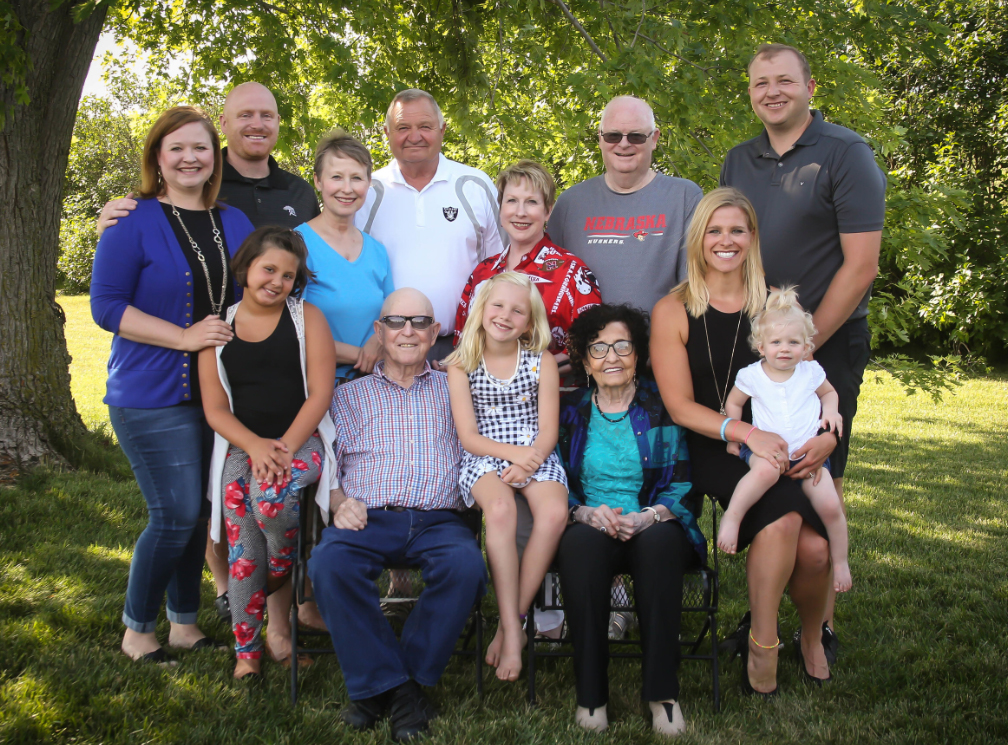Farm Family Passes Down Stories, Traditions
Celine Mlady and her family were recognized in August for owning their Knox County land for more than 130 years.
By Sierra Karst UNL Journalism Student August 2019

Celine Mlady's father once said something that always stuck with her: "If you have the land, you always have something."
Mlady came from a long line of Grimm family farmers who have lived on the land since 1885. John Thomas Grimm emigrated from Germany and purchased the Knox County land from another man for just over $1,000.
The land's original owner purchased 160 acres as part of a larger federal program intended to fund state universities. Two congressional acts dedicated 135,000 acres of "land-grant university" land to Nebraska in the 1860s.
Mlady and her family were recognized at the Knox County Fair in August 2019 for owning their land for more than 130 years.
"It's neat to be a part of the university's big-picture history," Mlady said in a phone interview.
Mlady's family also passed down stories and traditions that tied her history with the land.
John and Matilda Grimm bore all their children on the quarter of land Mlady lives on now. She remembers hearing stories of "the baby in the trees." One of Matilda's children was stillborn. Matilda's aiding midwife wrapped the baby in a blanket and buried it between two cedar trees.
Generations later, young Celine Mlady heard the story from her mother. She was curious if she could find the grave's location herself. Years later, Mlady's daughter searched for the same physical proof of a family story passed down for generations.
Mlady's grandfather, Ernest Grimm, at 16, faced a near-death experience on his farm. As he plowed the fields, he fell off his horse, breaking his arm and cutting his head on the equipment.
A salesman passing the farm noticed Grimm's horses running loose and stopped them. He then headed to the farmhouse and found Grimm's brother, William, to help locate and rescue the injured 16-year-old.
Ernest Grimm survived the accident after being cared for by Old Doc Swift in nearby Crofton. He continued to farm and left behind fences, trees and buildings that still stand today.
Mlady herself weathered a terrible snowstorm that left her school bus stranded several miles from home. A neighbor took her and several other kids in for the night.
More than the power outages or her worried parents, the then 5-year-old was most concerned about having to sleep in her high school-aged neighbor's long johns. But after a day or two, Mlady returned safely home.
Though the land hadn't changed much in a century and a half, the way it was farmed had evolved with new technology.
"We would walk bean fields and get a penny a weed," Mlady said, reminiscing on her childhood. "No one walks bean fields anymore."
Nowadays, farmers plant seeds that are genetically resistant to weeds and use a wick to apply pesticides.
Mlady still remembers bringing a bucket of lunch and water to her father and the farmhands at 4 p.m. every day in the summers. They would all sit in the shade, sometimes nursing swollen faces from bee stings, to eat together.
When remodeling the farmhouse, Mlady kept a touch of tradition by maintaining the bell that had signaled countless meals for generations of her family.
She also has taught her kids and grandkids about life through farm work.
Both of her kids were 4-H members "from the second they could until they couldn’t anymore," she said.
Her granddaughter showed a calf named Snickers at the county fair as a 4-H Clover Kid with the help of her husband this year.
"Kevin helped trim him. A little off the back and a little off the belly," Mlady said. "He couldn't take too much off the belly, or he'd look like a skinned jackrabbit."
Mlady also enjoyed watching her granddaughter experience bottle feeding a calf for the first time. The girl was surprised by how rough the calf's tongue was and how aggressive it could be when it wanted its bottle.
A few years ago, the then 4-year-old was also surprised to see her grandfather stick his arm up a cow's rectum. When her mom explained grandpa was just trying to see if a baby is in there, she seemed satisfied enough with the answer, Mlady said.
Mlady said she hopes to keep the land in the family, a quarter to each of her children so they and her granddaughter can enjoy it as much as possible.
She and her husband currently rent out land to a younger farmer and maintain 40 dairy cows. They also have careers working as a certified nursing assistant and lumber yard co-manager, respectively.
Mlady called herself a realist and noted she understood her kids may not be able to keep the land.
"The small [farms] are just truly becoming a thing of the past," Mlady said. "You cannot make enough money doing it."
Money-making or not, Mlady said she enjoys the peacefulness of her land.
"I can sit on the front porch and if it's quiet, I can hear bird wings flap and the neighbors cows and if someone closes a gate half a mile away," she said.
Mlady also enjoys attending Husker football games. She hasn't missed too many in her 10 years of holding season tickets.
She and her husband of 40 years both feel a strong pull to their land and are glad to see the next generation's care for it, too.